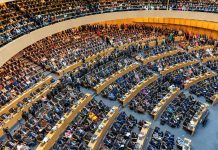Africa-Press – Mauritius. Inspired by her father who was very much involved in social work and community development, and the likes of Edward Said and Noam Chomsky – the intellectuals who denounce all forms of injustice – and obeying to some kind of call to join the political fray to transform the human condition and think of the greater good, Sheila Bunwaree emerges from the lot as a politician with new ideas and the guts to see them through, imbued as she is with the enthusiasm and the naivety of the new adherent (see last week’s interview of S.
Bunwaree in this paper). For Prof Bunwaree who has been for years in the sole company of academics before creating her own ‘Parti Justice Sociale’, she comes from a milieu that does not usually give rise to good politicians, given the politics of the mainstream parties.
Such political candidates from academia tend to have strong convictions, but are often abstract and not good at the realpolitik that day-to-day politics imposes.
Politics is about compromise and our dear Professor cannot afford to compromise on principles, philosophical position, intellectual thoughts, and/or scientific truths.
Most of them cannot afford to lose credibility by changing their stance. Our professor cannot deny that her brief stint with Muvmam Liberater does tend to prove that point.
As regards her position on smart cities, the incestuous relationship between government and big business, the small planters, IPPs and the energy sector, the fishing community, the environment, etc.
, one can easily see that she would have been more at ease in a leftist or eco-socialist party like Resitans ek Alternativ or Lalit.
Being a fervent new adherent, with the right baggage stuffed with the Pickettys, Sens, Saids and Chomskys of the contemporary world, she is being sent to the forefront – the barricades – to reconnect with an increasingly dismissive public.
What is unfortunate and unacceptable is that once in power, these mainstream political parties not only let us down, but connive with the unaccountable elite with its own agenda and vested interests to smother our calls and attempts for change.
Finally they turn out to be more of the same – the same arrogance, the same me-know-everything attitude, the same cronyism, lack of boldness and newness in reforms and policy initiatives.
It usually does not take long for such enthusiastic reformers like Prof Bunwaree to see their ideals battered by the realities of politics and to realise how quickly the mainstream parties jettison the all-too-common hermetic language of academia in favour of the potent slogans that appeal to the gut, not the head.
I do not know whether Prof Bunwaree’s study of some of our political parties in the course of her research project for the Electoral Institute of South Africa did reveal that her newly adopted party has become a victim of the very ills that it was supposed to fight and eradicate.
Indeed, its recent internal elections for the Comité Central and Bureau Politique opened an ugly vein of animosity and divisive politics and revealed its underbelly.
Lots of people did not like what they saw, including the choice of the leader’s lieutenants — not on the basis of their honesty or competence but for their pliability and loyalty.
Yes, Professor, these mainstream political parties constantly disappoint us and we tend to lose faith in all parties, and ultimately in democracy. * * * The ESAAMLG MER && Technical Compliance Re-Rating
This follow-up report of the Eastern and Southern African Anti-Money Laundering Group (ESAAMLAG) assesses the progress made by Mauritius to resolve the technical compliance shortcomings identified in its Mutual Evaluation Report (MER).
New ratings are given when sufficient progress has been made. This report does not cover the progress made by Mauritius in improving its effectiveness.
Progress in this area will be assessed as part of a subsequent follow-up assessment. If sufficient progress has been made, the Immediate Outcome ratings may be reviewed. This follow-up report only assesses the level of technical compliance with the Financial Action Task Force’s recommendations, i. e.
, whether the legal and other regulations in place to combat money laundering and the financing of terrorism and proliferation are in line with FATF’s standards, known as the FATF 40 Recommendations.
There are four levels of ratings for technical compliance: Compliant, Largely Compliant, Partially Compliant, and Non Compliant. Mauritius was rated Compliant on 4 FATF Recommendations, Largely Compliant on 10 Recommendations, Partly Compliant on 12 Recommendations, and Non Compliant on 14 Recommendations.
That was an extremely poor reflection of the state of our Anti-Money Laundering/Combating the Financing of Terrorism (AML/CFT) regime. For inclusion on the FATF blacklist, another criterion is when the country is Non Compliant or Partly Compliant on at least 20 FATF recommendations, i.
e. , is faring poorly on half of the 40 Recommendations. Mauritius received in July 2018 a total of 26 Non Compliant and Partly Compliant Ratings – a dismally poor score.
In response, Government introduced new amendments to the AML/CFT regime in the Finance Bill 2018, and new Financial Intelligence and Anti Money Laundering Act (FIAMLA) regulations which became effective on 1 Oct 2018.
Amongst other measures, stricter customer due diligence requirements, the broadening of the definition of Politically Exposed Persons (PEPs), and the closer identification of beneficial ownership which aligned our legal framework better with FATF standards.
Following a submission from Mauritius, the ratings on technical compliance had been revised by Esaamlag in the follow-up report and Technical Compliance Re-Rating.
Thus, 6 Non Compliants have been rerated as 2C, 3LC and 1PC 1 5 Partially Compliant ratings were apparently to 4C and one remained PC, and one LC changed to Compliant.
These changes would reduce the number of Non Compliant and Partly Compliant to 16, which takes Mauritius out of the danger zone. Now Mauritius has a one-year Observation Period to work with ESAAMLG to address the deficiencies before a formal review by the FATF. But this is only part of the narrative. The other component of the Mutual Evaluation Report is the effectiveness assessment.
On the basis of FATF methodology, effectiveness is rated on 11 outcomes, ranging from whether supervisors effectively supervise, monitor, regulate financial institutions and Designated Non-Financial Businesses and Professions (DNFBPs) for AML/CFT compliance commensurate with the risks and to whether ML/TF offences and activities are effectively investigated and offenders are prosecuted and subject to proportionate sanctions.
There are 4 levels of ratings of effectiveness: High, Substantial, Moderate, and Low. The effectiveness ratings for Mauritius are dismal. It is rated Low on 7 outcomes, and Moderate on 4 outcomes.
Among the criteria for the FATF to put a country on an AML/CFT Blacklist, is whether it has 9 or more Low or Moderate ratings on effectiveness, and at least 6 Lows.
Mauritius has 11 Low or Moderate ratings and 7 Lows. This poor rating is of grave concern. We barely escaped being backlisted last time round and we are not totally out of the woods as we are still on a kind of grey list and under monitoring .
Did we have to undergo through all these trials? There is no point in blaming the earlier regime or the previous Minister of Financial Services. Enough time has been wasted.
We need to realize that laws and regulations are not the end of the story, only the beginning. We must put greater effort at ensuring that these laws and regulations are effectively applied, and not meant for show.
To this end, the whole institutional framework must be reviewed with a view to enhancing performance and bringing about concrete results, with the injection of additional human and financial resources, greater capacity training, and greater cooperation between law enforcement agencies, amongst other measures.
For More News And Analysis About Mauritius Follow Africa-Press







